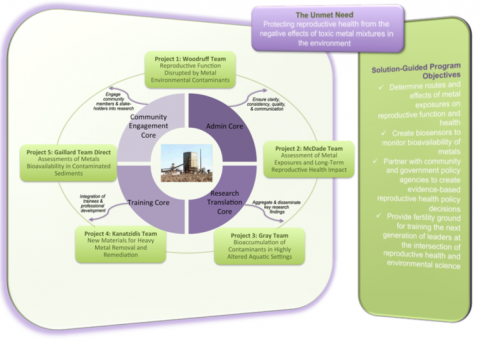Our understanding of the exposure to and impact of metals on human reproductive health is limited and represents a knowledge gap that has been a challenge to fill. Therefore, the goal of the Northwestern University Superfund Research Center in Reproductive Health Hazards (NU SRC) is to focus on the effects of environmental metal contaminants on reproductive function by determine the impact of metals on gamete (egg and sperm) function and reproductive health, developing novel bioassays for assessing the risk of environmental metals on reproductive function and determine the longitudinal risk of environmental metals exposure to human reproductive health. We will coordinate this effort with an evaluation of the routes by which environmental metal contaminants enter human populations in coordination with the development of methods for detecting and removing select metals that pose a threat to human health.
The mission of the NU SRC is to investigate the mechanisms by which superfund contaminants can influence reproductive health, how those contaminants track through the environment (food chain and microbial communities) and ultimately develop mitigation strategies that combine our new reproductive, eco-system and chemical knowledge base. Equal in importance to these scientific goals is our commitment to community engagement and translation of the work from bench, to beside, to community and school and into policy revisions that improve public health.
Members of the NU SRC participated in the 2012 and 2013 Makers program on Reproductive Health and the Environment, an innovative science policy training program to increase the ability of scientists, community leaders, and health care professionals to inform the U.S. Environmental Protection Agency (EPA) on current and emerging scientific findings to impact policy change. These teams visit with influential members of the EPA to advocate they update guidelines on reproductive toxicity. Read the group's position statement, Improving the Nation’s Reproductive Health: Updating the Guidelines for Reproductive Toxicity Risk Assessment.


